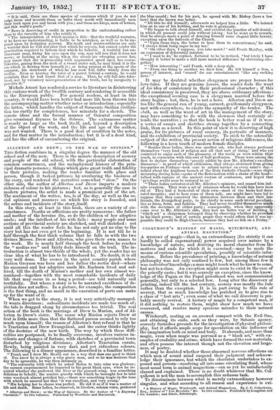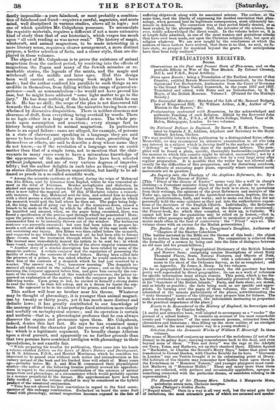COLQITHOUN'S HISTORY OF MAGIC, WITCHCRAFT, AND ANIMAL MAGNETISM. * A =roar
of magic—that is, an extraordinary (for strictly it can hardly be called supernatural) power acquired over nature by a knowledge of nature, and deriving its moral character from the ' motives and ends for which it is exercised—may be made the means of curious scientific speculation, possibly of scientific infor- mation. Before the prevalence of printing, a knowledge of natural philosophy was not only confined to few, but among those few it was individual knowledge; a man might teach what he knew to some, but not to a class. An exception might seem to exist in the case of the priestly caste ; but it was scarcely an exception, since the know- ledge of the Pagan or the Papal priesthood was not communicated generally, but only to a selected few. Long after the discovery of printing, indeed till the last century, secrecy was mostly the rule rather than the exception. It is in part owing to this rule of secrecy, that so much knowledge has perished as to give rise to a class of "lost arts " ; even some of what we call discovery is pro- bably merely revival. A history of magic by a competent man, if it did nothing to restore them, might show how much we have recovered, and resolve many specious miracles to their natural causes.
Witchcraft, resting on an avowed compact with the Evil One, and attaining its ends, such as they were, by Satanic agency, scarcely furnishes grounds for the investigation of physical philoso- phy, but it affords ample scope for speculation on the influence of the imagination both on mind and body. It abounds, and more than magic, even when magic was pursued as a " black art," with ex- amples of credulity and crime, which have formed the raw materials, and often possess the interest though not the elevation and large- ness, of poetry. It may be doubted whether those abnormal nervous affections on which men of sound mind suspend their judgment and acknow- ledge their ignorance, but which the charlatan undertakes to ex- pound and govern—resolving all into some circulating fluid, whose most usual term is animal magnetism—can as yet be satisfactorily elq‘sed and explained. There is no doubt whatever that Mr. Col- quhoun is not the man to accomplish this arduous task. To discriminate between what is merely extraordinary however singular, and what according to all reason and experience is evi-
• A History of Magic, Witchcraft, and Animal Magnetism. By 1. C. Colquhoun. Esq., Author of" Isis Revelata," &c. In two volumes. Published by Longman and
Co. London; and Black, Edinburgh.
deftly impossible—a pure falsehood, or most probably a combina- tion of falsehood and fraud—requires a careful, sagacious, and acute mind, well disciplined in various studies, above all in logic; not one of which qualities Mr. Colquhoun possesses. To accumulate the requisite materials, requires a different if not a more extensive kind of study than that of our historian's, which verges too much upon " all such reading as was never read." The history of magic, witchcraft, and animal magnetism, to be made interesting in a mere literary sense, requires a clearer arrangement, a more distinct purpose, a better selection of facts, and a closer style, than are dis- played in these volumes. The object of Mr. Colqnhoun is to prove the existence of animal magnetism from the earliest period, by resolving into the effects of magnetism the Pagan and many of the Jewish miracles or re- markable stories, the legends of the saints, and the magic and witchcraft of the middle and later ages. Had this design been well carried out, an amusing book might have been made ; had the author confined his parallels to such things as are credible in themselves, from falling within the range of general ex- perience—such as somnambulism—he would not have proved his case, but he might have adduced "some light matter to go to the jury." He has done nothing of the kind, nor do we think he can do it. He has no skill; the scope of the plan is not discovered till towards the close of the book, from the narrative having been over- whelmed by discursive disquisition. There is neither closeness nor clearness of drift, from everything being overlaid by words. There is no logic either in a large or a limited sense. The whole pro- ceeds upon assumption and assertion ; every strange fact in history being attributed to animal magnetism. In particulars there is an equal failure : cases are alleged, for example, of persons in a state of clairvoyance speaking in a language they are said never to have learned ; patients in the same state, prescribing for themselves or others, are said to describe a drug whose name they do not know,—as if the revelation of a language were an easier matter than that of a single term, not to mention that the clair- voyants in many cases seem to have a miraculous knowledge of the appearance of the medicine. The facts have been selected without judgment, and are of very various degrees of improba- bility; but the author delights in such tales as these,—very good as stories illustrative of Eastern superstition, but hardly to be ad- duced as proofs in a so-called scientific work.
" Among the scientific residents at Ghizni during the reign of Maltmond was Abu Rihan, sent by Almamor from Bagdad, where he was venerated al- most as the rival of Avicenna. Besides metaphysics and dialectics, he studied and appears to have drawn his chief lustre from his attainments in what is now called the magical art. Of this D'Herbelot relates a remark- able instance. One day, Mahmoud sent for him, and ordered him to deposit with a third person a statement of the precise manner and place in which the monarch would quit the hall where he then sat. The paper being lodg- ed, the king, instead of going out by one of the numerous doors, caused a breech to be made in the wall, by which he effected his exit ; but how was he humbled and amazed, when, on the paper being examined, there was found a specification of the precise spot through which he penetrated! Here- upon the prince, with horror, denounced this learned man as a sorcerer, and commanded him to be instantly thrown out of the window. The barbarous sentence was presently executed; but care had been taken to prepare be- neath a soft and silken cushion, upon which the body of the sage sunk with- out sustaining any injury. Abu Rihan was then called before the monarch, and requested to say whether by his boasted art he had been able to foresee these events, and the treatment through which he had that day. passed ? The Learned man immediately desired his tablets to be sent for; in which Were found, regularly predicted, the whole of the above singular transactions. "Another story of a similar description has been related by sonic of the magnetic authors. A certain conjuror had the reputation of possessing the faculty of reading the contents of closed letters. Having been called into the presence of a prince, he was asked whether he would undertake to in- form hint of the contents of a despatch which he had just received by a &airier. The answer was, Yes; tomorrow morning.' The dispatch re- mained all night sealed in the cabinet of the prince ; and on the following morning the conjuror appeared before him, and gave him correctly the con- tents of the letter. Astonished at this wonderful occurrence, the prince re- quested an explanation of the matter; which the conjuror gave him in the following terms. Upon going to bed, he excited in himself a stron" desire to read the letter ; he then tell asleep, and in a dream he learnt the con- tents. He appeared to be in the cabinet of the prince, and read the letter."
This author will bear no brother near his throne. Whatever may be thought of phrenology, it is younger than animal magnet- ism by twenty or thirty years, yet it has much more distinct and definite laws ; it has greatly contributed to our knowledge of the anatomy of the brain ; it has perhaps fixed attention more clearly and usefully on metaphysical science ; and its operation is certain and uniform—that is, a phrenologist professes that he can always discover the organs and pronounce upon them. Mr. Colquhoun, indeed, denies this last fact. He says he has examined many beads and found the character just the reverse of what it ought to be : which is a legitimate argument. To broadly charge Atheism upon a rival pursuit, and apparently on no further grounds than that two persons have combined irreligion with phrenology in their speculations, is not exactly fair.
" While preparing his treatise for publication, there came into his hands a volume entitled Letters on the Laws of Man's Nature and Development, by H. G. Atkinson, F.G.S., and Harriet Martineau, which he considers too Important to be passed over without such notice and animadversion as his cursory perusal of the book and his limited time will admit of. Many years ago—probably before Mr. A. and Miss M. commenced their physiological studies—the author of the following treatise publicly avowed his apprehen- sions in regard to the contemplated combination of the sciences of animal magnetism and phrenology, as a circumstance which would probably operate in a manner prejudicial to the former. His apprehensions have now been fully verified ; and the volume alluded to may be considered as the hybrid product of the unnatural conjunction. "Time has not altered his first convictions in regard to the fatal conse- quences of this unhappy combination. Embarked on board the same frail vessel with phrenology, animal magnetism becomes exposed to the fate of, suffering shipwreck along with its associated science. The author, at the same time, took the liberty of expressing his decided conviction that plus. nology, when pursued into its legitimate consequences, must ultimately ter- minate in Atheism. The connexion was at that period faintly denied, or at least evaded, by the phrenologists. Gall, the inventor of the science, how. ever, boldly acknowledged the direct result. In the volume before us, it is at length fully admitted, in one of the most wanton and gratuitous attacks that have ever been made, not upon the Christian religion only, but upon all religion whatever. We are now taught by the conclusions at which the authors of these Letters have arrived, that there is no God, no soul, no fu- ture state, no prospect for mankind beyond the grave. Our anticipations have thus been fully realized."



























 Previous page
Previous page